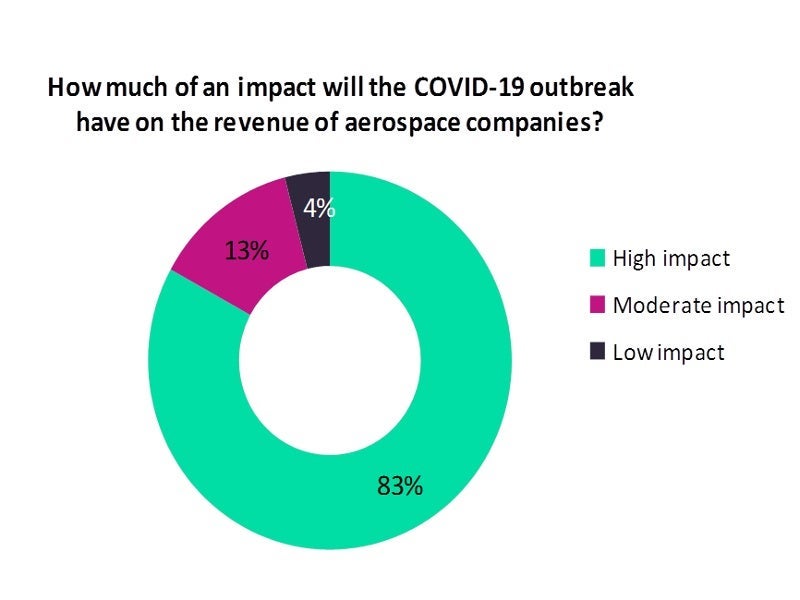International travel restrictions and lockdown measures implemented due to the COVID-19 pandemic have significantly impacted the aerospace industry.
Verdict has conducted a poll to assess the level of impact the pandemic will have on the revenues of aerospace companies.
Analysis of the results shows that the impact is expected to be severe, with a majority 83% of the respondents voting that the pandemic will have ‘high’ impact on the revenues of aerospace companies.
While 13% believe that the impact will be moderate, a minority 4% opine that the COVID-19 outbreak will have a low impact.

The analysis is based on 320 responses received between 27 March and 01 May.
How well do you really know your competitors?
Access the most comprehensive Company Profiles on the market, powered by GlobalData. Save hours of research. Gain competitive edge.

Thank you!
Your download email will arrive shortly
Not ready to buy yet? Download a free sample
We are confident about the unique quality of our Company Profiles. However, we want you to make the most beneficial decision for your business, so we offer a free sample that you can download by submitting the below form
By GlobalDataHow COVID-19 outbreak is affecting big aerospace companies
Aerospace companies such as Airbus and Boeing are facing disruptions in terms of cancelled orders and production halts. Airbus withdrew its 2020 guidance and announced plans to secure a credit facility of €15bn ($16bn).
Boeing reported a loss of $641m in the first quarter of 2020 and has announced job cuts, particularly in its commercial aeroplanes division.
United Technologies Corporation, which merged with Raytheon Company in 2020 to form Raytheon Technologies, announced cost-cutting measures including suspension of discretionary spending, hiring freeze, and reduction in capital investment to mitigate the impact of the pandemic on its commercial aerospace division.
Another aerospace major Lockheed Martin, which doubled commitments to support small business and supply chain and also announced plans to increase hiring, announced during its first quarter (Q1) 2020 results that the company has started to experience issues due to COVID-19 such as accessibility to certain location and delays in supplier deliveries.
Lockheed Martin, further, added that extended duration of the pandemic, which is currently uncertain, could impair assets and affect its outlook for the rest of the year.
IATA’s forecast about 2020 airline passenger revenues and recovery thereafter
International Air Transport Association (IATA) forecasts the near-term to be challenging for the civil aviation industry.
IATA projects airline passenger revenue to drop by 55% or $314bn in 2020 due to the COVID-19 pandemic. Airlines in Asia Pacific are expected to witness the biggest drop in revenue of $113bn in 2020.
In the current scenario, IATA estimates that the industry will face a U-shaped recovery lasting six to 24 months with the revival of domestic travel anticipated to be faster than that of the international market. Further, airlines are projected to spend up to $61bn of cash reserves in the second quarter to stay afloat.


